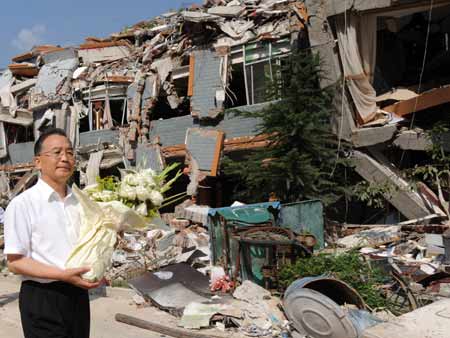国内英语新闻:Chinese premier back in quake area to inspect rebuilding
"The relief work [so far] is successful," said Wen, on his fourth visit to Sichuan since the quake. "Now we are entering a critical stage to boost rehabilitation."
With a combination of temporary housing and repaired buildings, about 4.45 million homeless families in the province have found accommodation.
Wen visited Zaoshu Village, Qingchuan County, one of the worst-hit areas, as the villagers were busy building or repairing houses.
 |
Chinese Premier Wen Jiabao (L) shakes hands with workers while visiting a road repair site near the epicenter, Yingxiu, southwest China's Sichuan Province, Sept. 2, 2008 |
A couple, Shi Guangwu and Zhang Zhengfang, told him that they received a subsidy of 23,000 yuan (3,333 U.S. dollars) from the government to build a new residence.
 |
Chinese Premier Wen Jiabao lays a wreath at a mass burial site of quake victims in the worst-hit Beichuan County, southwest China's Sichuan Province, Sept. 1, 2008. |
"I am glad to see farmers in the quake area are busy rebuilding their homes with their own hands. As long as we carefully plan and organize the work, new houses will rise soon," said Wen, who expressed appreciation for their self-reliant attitude.
During the four-day trip beginning Sunday, Wen also visited an urban community in Qiaozhuang Town, Qingchuan. Permanent home rebuilding has not started in the urban area yet as the government is working on a subsidy policy for urban survivors.
 |
Chinese Premier Wen Jiabao is surrounded by children in the Xinjian primary school in Dujiangyan city, southwest China's Sichuan Province, Sept. 2, 2008. |
"As soon as a policy is formulated, rebuilding will start," he said.
Besides residential buildings, schools and hospitals are priorities in rehabilitation.
At a temporary hospital in Qingchuan, Wen promised patients that the new hospital would be built soon and medical facilities would be better than before the earthquake.
 |
Chinese Premier Wen Jiabao (C) visits Zaoshu Village, Qingchuan County, one of the worst-hit areas in southwest China's Sichuan Province, Aug. 31, 2008. |
Wen thanked them for lending a hand to quake survivors.
On the morning after the earthquake, the country saw Wen standing on the rubble of the Xinjian primary school in Dujiangyancity, encouraging a trapped child through a crack. Wen returned to the school, which is in makeshift buildings, during this visit.
More than 240 students in the school were killed in the quake.
Standing in a classroom before the blackboard, he said to the students: "You are our country's future. I believe beautiful flowers will blossom over the debris of the earthquake."
Children presented handmade cards to Wen and invited him to take photos with them. The Premier presented flowers and bowed three times under the national flag on the campus to mark the victims.
Agriculture and industry were gradually recovering in the quake area.
At Yongquan Village in Deyang City, people were harvesting rice and planting potatoes. Wen went into the field, asking farmers about their crop yield. Told there was a bumper rice harvest despite the quake, he urged local officials to resume production as soon as possible where conditions allow.
At quake-devastated Dongfang Steam Turbine Co., Ltd. of Deyang, which Wen had visited twice previously, he was visibly happy to see production back at the pre-quake level.
He urged employees to continue working to build the company into a more advanced, secure and sustainable organization.
The premier also visited a road repair site near the epicenter,Yingxiu, praising the soldiers and workers who braved aftershocks and landslides to keep the road clear after the quake.
The worst-hit Beichuan County must be relocated as it was severely damaged in the quake and the original site might be vulnerable. Wen again visited the debris where the county seat was once located. He trudged on foot for an hour through the debris with a heavy heart.
He laid a wreath at a mass burial site of quake victims and observed a one-minute silent mourning period together with his entourage.
He told survivor Wang Dan, a 26-year-old woman of Qiang ethnic group, that the pain was overwhelming but the Beichuan people were strong.
"Although half of the population perished, the other half -- the survivors -- will build a new Beichuan with hope," he said.
When invited by Wang to come again when the new Beichuan is built, Wen promised he would come to the place, which he would remember for life.
He told local officials that the county should be rebuilt not only materially but also spiritually, as its unique Qiang culture should be preserved and promoted.
Presiding over a meeting attended by Sichuan provincial-level officials on Tuesday night, Wen said the quake rescue and relief work had entered an important phase of reconstruction. He urged local governments to seriously implement the reconstruction plan approved by the State Council, the country's Cabinet, and lead local people to accomplish the major tasks of rehabilitation and reconstruction in three years.
相关文章
- 英语文摘:China urges G7 to cease interfering in its internal affairs
- 英语文摘:HKSAR gov't strongly refutes G7, EU statements on chief executive election
- 英语文摘:Xi's keynote speech at opening ceremony of Boao Forum for Asia Annual Conference 2022 publ
- 英语文摘:Xi attends ceremony marking centenary of Communist Youth League of China
- 英语文摘:Xi talks with Macron over phone
- 英语文摘:External interference in Hong Kong affairs doomed to be self-defeating: Commissioner's off
- 英语文摘:Chinese spokesperson slams Western countries smearing Hong Kong election
- 英语文摘:China calls for equal, balanced global development partnership
- 英语文摘:Xinhua Headlines: A look at younger generation on China's new journey
- 英语文摘:Chinese vice premier reiterates dynamic zero-COVID policy




 手机网站
手机网站